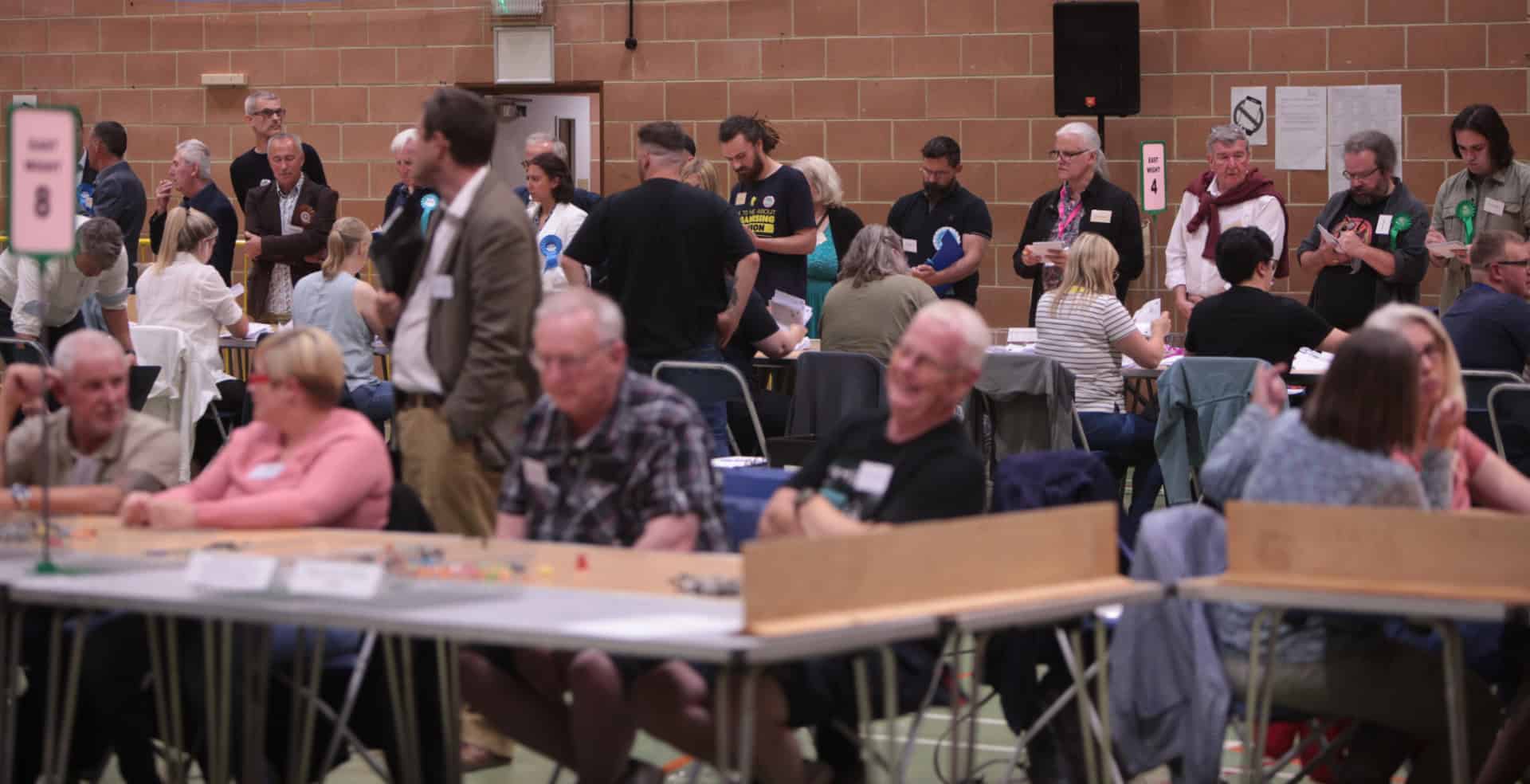OnTheWight always welcomes a Letter to the Editor to share with our readers – unsurprisingly they don’t always reflect the views of this publication. If you have something you’d like to share, get in touch and of course, your considered comments are welcome below.
This from Harry, a 30-year-old nurse from Newport. Ed
A reflection on the General Election results 2024, on the Island and nationally.
Well, what a week it has been. And I bet we all cannot wait to stop talking about politics for a bit and get back to our daily lives. But, before we do, I think it is important that we reflect on the local and national results, the stories these tell us, and consider what next for isle of wight politics.
What we saw Locally? – Isle of Wight West
Isle of Wight West saw a big swing away from the conservative candidate (Bob Seely) and towards our new Labour MP – Richard Quigley. The conservatives gained about 30% of the vote (similar to East Wight) but saw a -26% drop in their vote share from 2019. Reform UK made a significant impact (new to this seat, and UKIP did not stand previously), although they won 20% fewer votes than on the East. LibDem’s scored 8% (similar to the East and new this year as they didn’t stand in 2019) and the Green party 7% – much lower than in the East.
What does this mean?
Clearly we can see two clear message from this result
1) The Island has had enough of its previous Conservative MP (sewage scandals, sausage scandals, association with Liz Truss etc, the list goes on).
2) The West of the Island is united behind Richard Quigley as the best local MP.
Other points to consider
1) The Green vote for West was 7% (compared to 15% for the whole Island in 2019). This suggests that a lot of the green vote followed Vix Lowthion to the East where she is considered the best local progressive candidate.
2) Reform is new in IW West – with no history of UKIP vote, but it got slightly higher than the national average vote share. Considerations – Break down in conservative vote? High levels of need on the Island not being addressed? All local politicians will need to consider this going forward, because it was certainly a loud statement of discontent at current politics.
3) LD and Green results were relatively low – however how many LD and Green voters leant their votes to the best local candidate Richard Quigley to beat Bob? We will not easily be able to know!
What we saw locally? IW East
Isle of Wight East is a more complex picture.
IW East saw a similar drop in conservative vote share (27%) and a similar conservative vote share (31%). Now the biggest surprise for many was the impact of the Reform vote. Reform, a new party here, won 21% of the vote, sending a clear message that they don’t feel either of the main parties represents their views. Labour saw a reduction in their vote share of 6%, a huge difference to the west – and I’ll explore this a bit more further down. The Greens saw an increase of 5% taking them into third place (aligns with the Vix Lowthion theory stated above). LibDems got 10% and Independent David Groocock won 410 votes, 1% of the vote.
What can we learn from this?
1) The conservatives still saw a similar drop in their vote share compared to the East – but this increase went largely to reform (and also some to the Greens and to LibDems).
2) Reform UK saw a significant result here, well above the national average. This suggests that many on IW East don’t see themselves reflected in the politics of the two main parties. Why was it so much bigger on the east? Perhaps the lack of a clear alternative to the current party (such as the west had with Richard Quigley)? I’m not sure, this will need more thought, and will require us to get out there and talk with our fellow constituents.
3) East Wight, unlike the west, was not united behind a single progressive candidate, with Vix Lowthion and Emily Brothers seeing similar vote share, with Greens just ahead of Labour. The importance of a good local campaign and a good local candidate cannot be overstated.
4) The Green result for IW East was 1 of only 6 around the country that beat Labour and will certainly make this a target seat for the Greens in 2019.
Other considerations
1) The LibDem vote was slightly higher at 10% of the vote on the east, which is probably more representative of the Island given the lack of a clear tactical choice like on the west.
The role of the East Wight Primary
The East Wight Primary played a significant role in this election locally. The EWP was a fully independent process which reviewed the local progressive candidates to pick a local’s champion. This was Richard Quigley on the west (didn’t require a primary as was clear) and needed to be determined on the west. All local candidates had the chance to impress the EWP during hustings and with their local campaigns. After 4 weeks of campaigning, the EWP concluded with 67% of the vote that Vix Lowthion would be the peoples champion and the best option to beat the right-wing parties (and they were right!).
EWP vs national tactical voting
Tactical voting played a large role in the General Election 2024. Many tactical voting sites made predictions on very inaccurate MRP data which put Labour as top for East (based on national swing) and did not predict Reforms performance – why? Because they did not consider the importance of local candidates and local data and in my opinion, national sites got IW east very wrong (kudos to Stop the Tories and tacticalvote.co.uk who did consider it). That is where a local primary comes into its own, but it can only work if people unite behind the people’s champion. If half trust the tactical sites, and half the local primary – it does not work. My question to Islanders would be – who should decide our local peoples champion – Islanders? Or a central tactical voting site? I know which I’d prefer.
The national picture
I’ll keep this brief but here are my overall headlines:
1) Labour won a massive majority of seats with only a 1.6% increase in vote share – whilst the Tory party collapsed by 20% and lost 251 seats. This is definitely more of a conservative loss, than a win for Starmer’s labour.
2) This is most un-representative parliament based on vote share – and calls for voter reform will be hard to ignore:
a. LD aprox 4 million – 71 seats
b. Reform UK 4 million – 5 seats
c. SNP 700,000 – 9 seats
3) The Reform Vote nationally is similar to that of UKIP previously, so it is not moving much. However, Europe is seeing the rise of the far-right, so it is something we must monitor. We need to understand why people are voting reform (I do not believe that they are all racist, I think many feel disillusioned and want real change).
4) We saw more pro-Gaza independent wins seats than we saw Reform candidates win seats.
What next?
I hope the Island continues to get political. Our turnout was slightly higher than the national average. Let’s keep campaigning, keep debating, and let’s keep striving to make the IW a better place.
Good luck to our two new MPs Richard Quigley and Joe Robertson.





